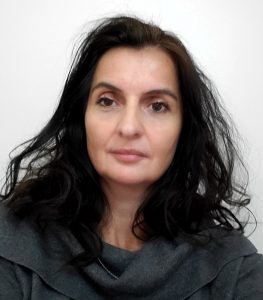The Department of Biochemistry & Molecular Biology is delighted to feature one of their outstanding members. Please meet Marija Vuckovic, Lab Manager at the Strynadka Lab, who was selected for the BIOCAPS Spotlight series this month!

Marija Vuckovic.
Marija is a laboratory manager at the Strynadka lab in the department of Biochemistry & Molecular Biology at the University of British Columbia. She completed her B.Sc. and M.Sc. in Biochemistry at the University of Belgrade, Serbia and moved to Canada in 2002. In 2003, she joined Natalie Strynadka’s Lab as a Research Assistant and have since worked on numerous projects and publications. She possesses extensive experience in conducting protein over-expression across a broad range of bacterial cells (BSL1- E. coli; L. lactis, and BSL2-Salmonella Typhimurium; SAUSA300; EHEC; EPEC), as well as in yeast, insect, mammalian cell, and cell-free expression systems. Employing a blend of molecular biology and structural biology techniques—including X-ray crystallography and cryo-electron microscopy (cryo-EM)—she has played an instrumental role in determining the structures of various type 3 secretion and bacterial cell-wall membrane spanning protein complexes.
Tell us about your current research focus and project.
Alongside numerous other members of the Strynadka Lab, I have dedicated many years, even to this day, to depicting the structure and function of the type 3 secretion system, essential for the virulence of many disease-causing Gram-negative bacteria including Salmonella typhimurium, Shigella dysenteriae, Enteropathogenic Escherichia coli (EPEC) and Pseudomonas aeruginosa. T3SS is a syringe shaped nanomachine composed of more than 20 proteins, that allows the specific and direct transport of bacterial virulence effectors across three membrane bilayers, delivering them from the cytoplasm to human host cells.
My additional research focus revolves around broad-spectrum β-lactam antibiotic resistance in Staphylococcus aureus, a prominent cause of infections globally. In clinical strains, resistance is primarily regulated by BlaR1, a two-component signaling receptor responsible for sensing β-lactams. It operates by directly cleaving the repressor BlaI, thereby inducing the expression of β-lactamase and the β-lactam-resistant transpeptidase PBP2a. The structure of S. aureus BlaR1 has been unclear since the gene’s initial identification over 30 years ago. Our lab has recently published the first high resolution cryoEM data that reveals the structure and advances our understanding of BlaR1-mediated antibiotic resistance. This work provides insights into the mechanism of BlaR1 signal transduction, potentially facilitating the development of therapeutics to treat drug resistant MRSA infections.
Marija is literally the heartbeat of our laboratory. Over the past two decades, every group member has been elevated by the amazing expertise, energy and kindness she brings to her role as wet lab manager. – Dr. Natalie Strynadka, Professor
What first motivated you to pursue your career?
What got me into biochemistry was the excitement of learning about life’s inner workings. I wanted to dig deep into cells and molecules to find ways to help people. The idea that my work could potentially make a difference in addressing significant health challenges is incredibly fulfilling and motivates me every day.
What do you like most about your job?
What I like most about my job is that no two days in the lab are the same, each bringing the possibility of doing something new. One day I might be conducting an exciting experiment to uncover a small piece of the antibiotic resistance puzzle, another day I might be optimizing PCR to ensure successful cloning, or on yet another day I might be troubleshooting a broken piece of equipment or receiving training on a brand-new one.
Another highlight of my job is working with passionate young students who possess the same drive and dedication towards research as me. I do my best to assist and train them throughout their journey in the lab by addressing their many inquisitive questions. Despite the difference in age and having many duties to juggle, I still somehow manage to keep up with them.
What is your favourite place to visit?
Despite having traveled to various places, Costa Rica holds a special place in my heart. The friendly and welcoming locals, along with the incredible and diverse wildlife, create a truly amazing atmosphere that enhances every experience. Its rich biodiversity, encompassing lush rainforests, stunning coastlines, and numerous volcanoes, is definitely a sight to behold. Learning Spanish and immersing myself in this blend of human warmth and diverse animal life has made each of my visits to Costa Rica truly unforgettable.
What advice would you give to a trainee just starting out?
I love cloning, and despite conducting various research and experiments, cloning has always been my niche. You can’t be the best at everything, so stay open-minded and allow yourself the freedom to explore until you discover that specific area or topic where you feel most comfortable and excel in it.
This story is republished from the Department of Biochemistry & Molecular Biology website: https://biochem.ubc.ca/biocaps-spotlight-marija-vuckovic/.


